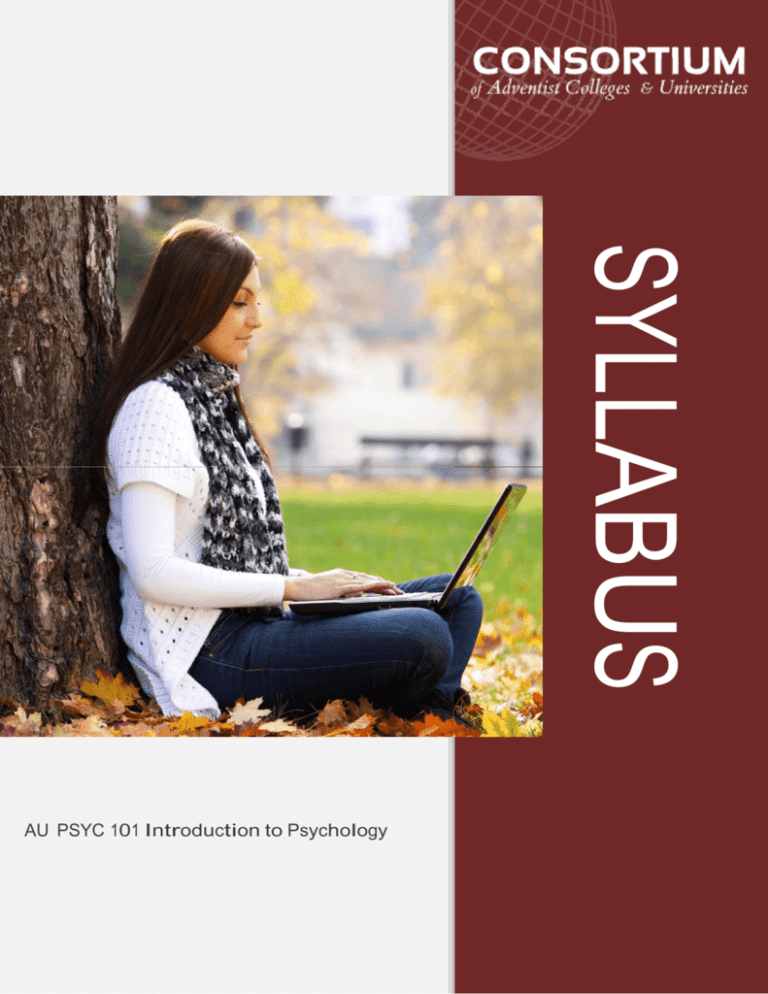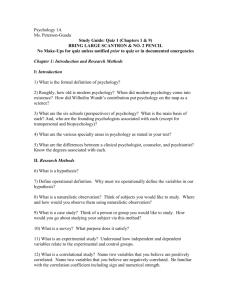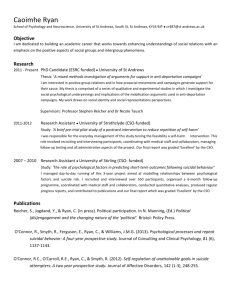
SYLLABUS
AU PSYC 101 Introduction to Psychology
Introduction to Psychology
Consortium of Adventist Colleges and Universities
Instructor Contact
Please refer to course in Learning Hub for the teacher contact information.
Note: This draft syllabus does not fully document the teacher and student interaction in this course.
Please check back later for an updated version.
Other Assistance
Username and password assistance
Enrollment and cancellations
helpdesk@andrews.edu
sderegister@andrews.edu
(269) 471-6016
(269) 471-6323
Bookstore
Technical assistance with Learning Hub
Technical assistance with your Andrews account
Exam requests
http://bookstore.mbsdirect.net/andrews.htm
dlit@andrews.edu
(269) 471-3960
andrews.edu/hdchat/chat.php
sdeexams@andrews.edu
(269) 471-6566
Any other questions:
sde@andrews.edu, (800) 782-4769 or (269) 471-6570
Part 1: Course Information
Course Descriptions
Andrews University
Principles of psychology including the study of growth, perception, learning, thinking,
motivation, emotion, personality, and mental health.
Required Textbook
Myers, D. G. (2014). Psychology. 10th edition. New York, NY: Worth Publishers.
ISBN-13: 978-1-4641-6474-3
Course/Technical Requirements
Internet connection (DSL, LAN, or cable connection desirable).
Page 2
Introduction to Psychology
Syllabus
Learning Hub Access
This course is delivered online through Learning Hub at http://learninghub.andrews.edu
Your username is password is your Andrews username and password. You need to activate your
username and password to access Learning Hub. If you haven’t already done this, please do so
online here: https://vault.andrews.edu/vault/pages/activation/information.jsp
Call (269) 471-6016 or email helpdesk@andrews.edu if you need assistance
Credit Hours
This course is offered for 3 semester credits. Therefore, it is expected that you will spend a
minimum of 135 hours total on this course. It is very important that you budget your time well. Plan
for the time you need to carefully read/study through your text chapters, for participation in the
learning activities, and for taking chapter quizzes, mid-term and final exams.
Course Procedure
You will access all online lessons, course assessments and assignments, and other resources
on Learning Hub.
Part 2: Course Objectives
To gain an understanding of the concepts, terms, and research results in the many areas
of psychology, including:
Significant schools of psychology, research methods, sensation and perception, learning,
memory, thinking, language and intelligence, human development, emotions, stress and
health, personality, social psychology, psychological disorders, and psychotherapies.
To apply psychological principles to one’s life, gaining a better understanding of human
diversity and developing an better acceptance of self and others.
Part 3: Learning Activities, Quizzes & Exams
Course Structure
There are 17 modules (Introduction and Modules 1-16), using the chapters of the text as
unit guidelines.
Each module on Learning Hub follows a three-part format (Engage-Explore-Evaluate):
o
ENGAGE
o
A short lecture overview/comment/questions on Learning Hub introduces
the material in each unit
A PowerPoint presentation located on Learning Hub illustrates and visually
reviews key concepts
EXPLORE
In this section of the module, a URL will link the student to LaunchPad,
which contains access to e-book, interactive learning materials, video clips,
and a self-check quiz.
50 total points (for participation, and NOT based on scores earned) are
available for participation in all learning activities
Page 3
Introduction to Psychology
Syllabus
In working through this section, reference to textbook (e-book) is
encouraged
A short 10 question self-check quiz (one attempt/15 minutes) closes the
EXPLORE section.
Again points are earned for participation in all activities in this section, and
NOT based on scores achieved.
o
EVALUATE
A chapter quiz (50 points each) provides the opportunity to assess learning
on each module
The chapter quizzes are ‘closed book’/on-your-honor assessments. They
are provided to establish what the student has learned from engagement in
the previous two sections (Engage, Explore)
The student has one attempt and a time limit of one hour to complete each
quiz
Each quiz will include:
Multiple Choice/T-F questions (30-35)
Short answer questions (15-20)
Mid-term and final exams (200 points each)
Exams will follow the same format (MC/T-F/short answer questions)
as the end-of-module quizzes
Exams are to be taken under the supervision of a proctor and under
‘test’ conditions (see ‘Exams’ below)
Chs 1-8 must be completed before the mid-term exam is taken
Chs 9-16 must be completed before the final exam is taken
Completing Coursework
All work for this course will be submitted electronically through Learning Hub.
Schedule
Week
Module(s)
Readings [Engage]
Intro
Introduction & orientation
Submit schedule
Getting acquainted
Academic honesty
Prologue: The story of psychology
Module 1: Thinking critically with
psychological science
Orientation
Writing expectations
1
2
Module 2: The biology of the mind
3
Module 3: Consciousness and the twotrack mind
4
5
Module 4: Nature, nurture, and human
diversity
Module 5: Developing through the lifespan
6
Module 6: Sensation and perception
7
Module 7: Learning
Module 8: Memory
8
9
Mid-term exam
Module 9: Thinking and language
Module 10: Intelligence
[Explore/Evaluate]
Due Date
January 9, 2015
Psychology, Prologue, pp
1-15
Psychology, Ch 1, pp. 1645
Psychology, Ch 2, pp. 4683
Psychology, Ch 3, pp. 84127
LaunchPad learning activities
Prologue and Chapter 1
quizzes
January 9, 2015
LaunchPad learning activities
Chapter 2 quiz
LaunchPad learning activities
Chapter 3 quiz
January 16, 2015
Psychology, Ch 4, pp.
128-165
Psychology, Ch 5, pp.
166-215
Psychology, Ch 6, pp.
216-263
Psychology, Ch 7, pp.
264-297
Psychology, Ch 8, pp.
298-335
Chs 1-8
Psychology, Ch 9, pp.
336-365
Psychology, Ch 10, pp.
366-401
LaunchPad learning activities
Chapter 4 quiz
LaunchPad learning activities
Chapter 5 quiz
LaunchPad learning activities
Chapter 6 quiz
LaunchPad learning activities
Chapters 7 & 8 quiz
January 30, 2015
Review/Exam
LaunchPad learning activities
Chapters 9 & 10 quizzes
February 27, 205
March 6, 2015
January 23, 2015
February 6, 2015
February 13,
2015
February 20,
2015
Page 4
Introduction to Psychology
Syllabus
10
Module 11: Motivation and work
11
Module 12: Emotions, stress and health
12
Module 13: Personality
13
Module 14: Social psychology
14
Module 15: Psychological disorders
15
Module 16: Therapies
16
Final Exam
Psychology, Ch 11, pp.
402-457
Psychology, Ch 12, pp.
458-511
Psychology, Ch 13, pp.
512-551
Psychology, Ch 14, pp.
552-603
Psychology, Ch 15, p.604649
Psychology, Ch 16, pp.
650-686
Chs 9-16
LaunchPad learning activities
Chapter 11 quiz
LaunchPad learning activities
Chapter 12 quiz
LaunchPad learning activities
Chapter 13 quiz
LaunchPad learning activities
Chapter 14 quiz
LaunchPad learning activities
Chapter 15 quiz
LaunchPad learning activities
Chapter 16 quiz
Review/Exam
March 13, 2015
March 20, 2015
April 3, 2015
April 10, 2015
April 17, 2015
April 24, 2015
May 1, 2015
Exams
Both the mid-term and final exam must be supervised by a school or community official, such
as a teacher, librarian, registrar, or pastor, who is not related to the student.
Exam request forms are available in Learning Hub. You need to complete relevant learning activities
and quizzes prior to taking an exam. It is important to state clearly on the exam request form the
professional status, job title, or any other qualifications of the supervisor, as these will aid the
testing department in the approval process. If you are attending a college or university, you
must use the testing center at that institution. A student living near the Andrews University
School of Distance Education main office in Michigan must have the exams supervised at the
School of Distance Education testing office. However, the exam request should be sent in well
ahead of time. An online exam code cannot be sent to a supervisor who has the same address as
the student unless the address is known to be that of a school, mission facility, etc. All college
students must present photo identification to their supervisors before taking exams. If you
cannot take your exam by the deadline date, email sdeexams@andrews.edu.
No exam is returned to the student or supervisor. Test grades are available to the student as
soon as the exam is graded. Feedback from the instructor for the midterm exam will provide
information for studying for the final exam. There are ample opportunities to review and
prepare for tests and exams built into each module, thus no exam re-takes are allowed in this
course.
Part 4: Grading Policy
Graded Course Activities
Your final grade will be the result of four components: Participation in the interactive
learning activities (30%), Chapter quizzes (30%), Midterm Exam (20%), and Semester
Exam (20%). You will need to complete Learning Activities, Chapter Quizzes, the Midterm
Exam, and the Final Exam before a final grade can be issued.
Viewing Grades in Learning Hub
•
•
Click into the course.
Click on the Grades link in the Settings Box to the left of the main course page, to obtain
your ‘user report’.
Letter Grade Assignment
Letter
grade
A
A-
B+
B
B-
C+
C
C-
D
Page 5
F
Introduction to Psychology
Percentage 93100%
Syllabus
9092%
8889%
8387%
8082%
7879%
7377%
7072%
6069%
0-59%
Part 5: Course Policies
Communication with your Instructor
It is important to remember that while the Internet is available 24 hours a day, your instructor is
not. You can expect that your instructor will respond to your e-mail messages within 2 business
days during the week, and may not be available to respond on weekends.
Maintaining Professional Conduct Both in the Classroom and Online
The classroom is a professional environment where academic debate and learning take place.
Your instructor will make every effort to make this environment safe for you to share your
opinions, ideas, and beliefs. In return, you are expected to respect the opinions, ideas, and
beliefs of other students in all online communications. Students have the right and privilege to
learn in this class, free from harassment and disruption.
Academic Accommodations
Students who require accommodations may request an academic adjustment as follows:
1. Read the Andrews University Disability Accommodation information
at https://www.andrews.edu/services/sscenter/disability/
2. Download and fill in the disability form
at http://www.andrews.edu/services/sscenter/disability/accommodationsreqform.pdf .
Preferably type answers. To save a digital copy, 1) print to file and save or 2) print and
scan. Email the completed form and disability documentation (if any)
to success@andrews.edu or fax it to 269-471-8407.
3. Email sdestudents@andrews.edu to inform the School of Distance Education that a
disability has been reported to Student Success.
Commitment to Integrity
As a student in this course (and at this university) you are expected to maintain a high degree of
professionalism, commitment to active learning and participation in this class, and also maintain
integrity in your behavior in and out of the classroom.
Honesty
Using the work of another student or allowing work to be used by another student jeopardizes
not only the teacher-student relationship but also the student’s academic standing. Lessons may
be discussed with other students, tutors may help to guide a student’s work, and textbooks,
encyclopedias and other resource materials may be used for additional assistance, but the actual
response must be the student’s own work.
Exams must be completed in the presence of an approved supervisor without the assistance of
books, notes, devices or outside help unless otherwise specified in the exam directions. The
student should have no access to the exam either before or after it is taken. A student who gives
information to another student to be used in a dishonest way is equally guilty of dishonesty.
Any violation of this policy will be taken before the Higher Education Academic and Curriculum
Committee for appropriate punitive action.
Page 6
Introduction to Psychology
Syllabus
In Conclusion: Pay particular attention if you are a Psychology Major
This course is relevant to the Major Field Test (MFT), an exit comprehensive examination which you will
take at the end of your program if you intend psychology as a major. Material covered in this course will
provide a good review resource!
Copyright © 2014 by Andrews University.
All rights reserved. No part of these course materials may be reproduced, stored in a retrieval system, or transmitted by any form
or by any means-electronic, mechanical, photocopying, recording, or otherwise-except as may be expressly permitted by the
applicable copyright statutes or in writing by Andrews University.
Page 7





